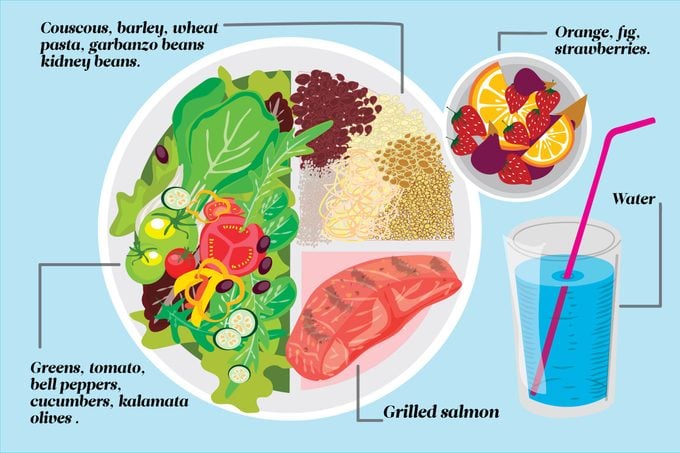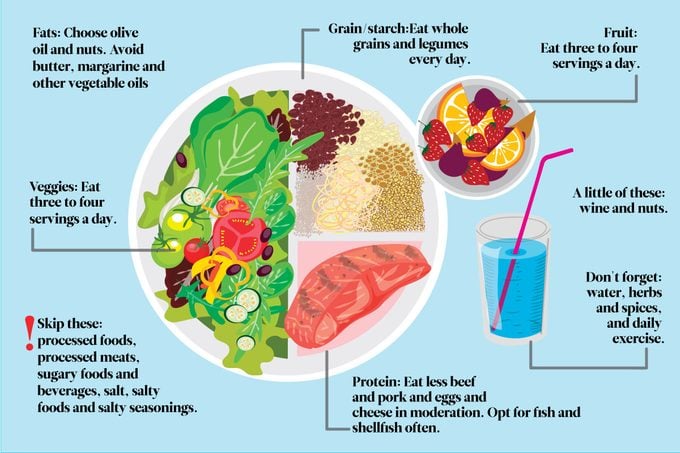This Infographic Is Your Mediterranean Diet Cheat Sheet
Updated: Aug. 27, 2017
Widely researched, this geographically influenced way of eating has incredible health advantages, but it wasn't always easy to follow—until now.
Chances are, you’ve read about the Mediterranean diet and all the ways it helps your body. The diet includes foods and cooking methods native to the regions of Greece, southern Italy, France, and Spain. The people living in this region tend to be healthier overall, so researchers decided to investigate into this lifestyle—and the findings are striking.

Practically every system in the human body benefits from theMediterranean diet. Consider these findings: Weight reduction, improvement of symptoms linked with metabolic syndrome, lower risk of certain cancers and heart disease, and better asthma symptoms in children. Mental health appears significantly enhanced by the plant-based diet, with lower risk of Alzheimers disease and dementia, as well as clearer cognition. Lipids (think cholesterol and triglycerides) and liver biomarkers improve markedly in people with non-alcoholic fatty liver disease (NAFLD) when they eat the Mediterranean way. Lastly, one recently published study in the British Journal of Nutrition found positive changes in the gut microbiota pattern with adults following the Mediterranean diet.

Using this cheat sheet, you can glean these health benefits, too.
- Veggies: Eat three to four servings a day. Mediterranean choices include:artichokes, arugula, beets, broccoli, Brussels sprouts, cabbage, carrots, celery, celeriac, chicory, collard greens, cucumbers, dandelion greens, eggplant, fennel, green beans, kale, leeks, lettuce, mushrooms, mustard greens, nettles, okra, onions (red, sweet, white), peas, peppers, pumpkin, purslane, radishes, rutabaga, scallions, shallots, spinach, turnips, and zucchini. (These are the healthiest vegetables you can eat.)
- Grain/starch: Eat whole grains and legumes every day. Mediterranean choices include: barley, buckwheat, bulgur, farro, millet, oats, polenta, rice, quinoa, wheat berries, whole-grain breads and pasta, couscous, potatoes, sweet potatoes, and legumes/pulses (lentils, cannellini beans, chickpeas, kidney beans, and peas).
- Protein: Eat less beef and pork and eggs and cheese in moderation. Opt for fish and shellfish often. Mediterranean choices include: abalone, clams, cockles, crab, eel, flounder, lobster mackerel, mussels, octopus, oysters, salmon, sardines, sea bass, shrimp, squid, tilapia, tuna, whelk, yellowtail. (Here’s how to sneak in more protein without trying.)
- Fruit: Eat three to four servings a day. Mediterranean choices include: apples, apricots, avocados, cherries, clementines, dates, figs, grapefruits, grapes, melons, nectarines, olives, oranges, peaches, pears, pomegranates, strawberries, tangerines, tomatoes.
- Fats: Choose olive oil and nuts. Avoid butter, margarine and other vegetable oils
- Skip these: processed foods, processed meats, sugary foods and beverages, salt, salty foods and salty seasonings.
- A little of these: wine and nuts.
- Don’t forget: water, herbs and spices, and daily exercise.














